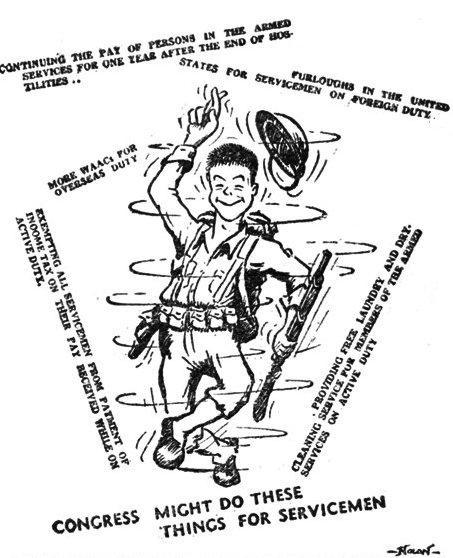
VOL. I NO. 20 DELHI, THURSDAY JANUARY 28, 1943.
Announced By Army, Navy WASHINGTON - The Army and Navy have jointly authorized that medals for service will be issued after the war to members of the Armed Forces. Meanwhile, ribbons signifying that the medals have been awarded will be conferred. An unusual feature of the ribbons is the inclusion of the national colors of the enemies U.S. servicemen are fighting, as well as the colors of the United States. The ribbons will be issued to men who arrived at the various theaters under orders between Dec. 7, 1941, and a date six months after the war's termination. The ribbons represent three major theaters: (1) American (the American continent except Alaska and Greenland); (2) Europe, Africa and the Middle East; (3) Asia, the South and Southwest Pacific (except Alaska and Hawaii). Bronze stars will be awarded for major engagements and a silver star for every five bronzes. |
NIP INSTALLATIONS IN BURMA
TARGET FOR MORE BLASTINGS
By Pvt. ROGER L. WHEELER Roundup Staff Writer
This week's activity of the Tenth Air Force is another chapter of the same thing - more bombings of Burma, with a minimum of respite for the Jap.
The India Air Task Force did most of the heavy slugging and their well-aimed bombs inflicted more damage on the Japs' badly-mauled railways, docks, storage facilities and bases.
A combined formation of fighters and medium bombers maintained bombing and strafing attacks against enemy installations at Kamaing, Northern Burma, during January 18th and 19th. On the first day, three large and sixteen small fires were reported after a closely-pressed attack. On January 19th, the attack was resumed in greater force, using both high explosive and incendiary bombs. Direct hits were reported on the building used as Jap headquarters, on the enemy barracks, and a warehouse. As a result of these operations, it is estimated that half of the enemy base is completely destroyed.
Also on January 19th, heavy bombers blasted the Bassein docks. The same day, a bombing attack was made on rail installations at Thazi. The railroad yards and warehouses at this point are vital to rail communication between Rangoon and Mandalay. Many hits were reported on the railroad junction and among storage sheds. Black smoke billowed from large fires, indicating destruction of Jap oil supplies.
Heavy bombers made a daylight attack against docks and shipping at Rangoon on January 24th. Many hits were scored on the docks, and two direct hits were made on a merchant vessel of approximately 6,000 tons. Later in the day, fighters and fighter-bombers carried out a bomb and strafing raid against Japanese storage areas at Shadazup in Northern Burma. Demolition and fragmentation bombs were dropped in the target area which was then heavily strafed with machine gun fire, leaving buildings in flames.
No personnel casualties were reported on any of these operations.
|
WANTED: ONE EACH BITERS DETACHABLE
"I don't want to go home. I just want some false teeth," declared toothless Pfc. Marvin Collins, who's been that way for the last 14 months.
Marvin's stationary dental work was removed while he was stationed at Ft. Crocket, Tex. He was fitted for replacements and could have put off his overseas duty until they were ready, but he didn't choose to. "You can see," he said, "what a big mistake I made." Collins said he's tried to acquire a set of G.I. biters and added: "There just doesn't seem to be any spare teeth in India. I'm plenty tired of a mashed potato and gravy diet, and I can't get the women to pay any attention to me. I can't even get them to bite the end of my cigars." |
By Pvt. LEO COAN
The squadron has several new pets. (Don't get excited, boys, they're all four-legged.) In addition to "Chico," the Errol Flynn of monkeydom, and Pfc. Sal Mazzoni's pup, "Basic," there's a parrot recently acquired by Pvt. Ralph Lawson and another dog of undetermined pedigree who is owned by the engineers but who is attached for feeding purposes to everyone in the squadron. The pup's career has been a full one since he joined the outfit. He made Tech. Sergeant's rating but already has been "busted" to Pfc. It's a dog's life, ain't it, pup?
What Army regulation stands - or stood - between the dashing Van Dyke beard Sgt. Les Kimble recently sported for a week?
The agreeable novelty of having native KP's had hardly worn off before Lt. Holden's mess hall blossomed out with bright colorful tablecloths as well.
"It's almost perfect," cracked one incredulous dogface, "but where's the dinner music?"
If your mail from the States isn't all you think it should be, Jack Armstrong, the All-American boy, is your man. Drop him a note and he'll have a member of his "Write a Fighter" club (The WAFs) boys writing you regularly and giving you all the lowdown from home. Those Hudson High boys are really on the ball. Ask Sgt. Paul (hoy, hoy) Zwicker. He's the first member of the squadron to be a recipient (from a none-year-old Ohio lad) of a WAF note.
In addition to its veteran bombardiers, T/Sgts. Fred Bramer, Robert Bourgeous, Delmar Harland, James Ruska, Arthur Goudreau; the squadron now numbers Sgt. Delbert Coulter, Corp. Todd A. Wallis and Pvts. Bob Jeffries, William Bailey, Eugene Montgomery, Norman Anderson and Sgt. Autis Carr among its egg layers.
BY PLANES, JEEPS, AND PACK
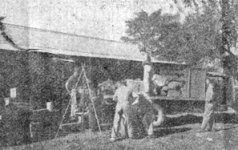 From a warehouse in Assam, supplies for U.S. Army forces in the isolated posts of the Naga Hills, are loaded
on to a truck. The packages contain mostly food and some of it has been shipped all the way from the
United States.
From a warehouse in Assam, supplies for U.S. Army forces in the isolated posts of the Naga Hills, are loaded
on to a truck. The packages contain mostly food and some of it has been shipped all the way from the
United States.
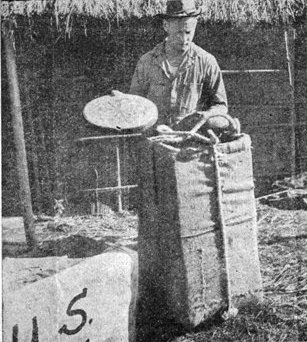 Corp. Wade V. Walter packs a dartboard and a football among other equipment for use by the men in a lonely
outpost. At the left is a package of mail. No matter where they are, soldiers must have mail from
home.
Corp. Wade V. Walter packs a dartboard and a football among other equipment for use by the men in a lonely
outpost. At the left is a package of mail. No matter where they are, soldiers must have mail from
home.
|
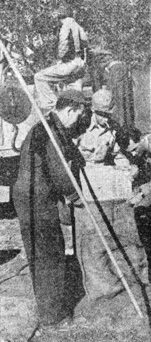 Packages are packed in burlap bags - each to weigh 60 pounds. Each package is carefully wrapped to
stand rough handling.
Packages are packed in burlap bags - each to weigh 60 pounds. Each package is carefully wrapped to
stand rough handling.
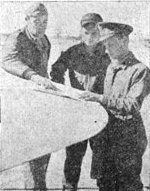 Pilots make last-minute checks before taking off. Left to right: Lt. Hoagg, Lt. L. E. Rippy, and
Capt. Charles E. Flore.
Pilots make last-minute checks before taking off. Left to right: Lt. Hoagg, Lt. L. E. Rippy, and
Capt. Charles E. Flore.
|
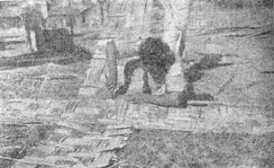 A local worker fashions a woven basket of locally grown bamboo. The burlap and other protective covering
is then fastened to the outside. To each of these loaded bags, a parachute is attached. The local
inhabitants needed no instruction.
A local worker fashions a woven basket of locally grown bamboo. The burlap and other protective covering
is then fastened to the outside. To each of these loaded bags, a parachute is attached. The local
inhabitants needed no instruction.
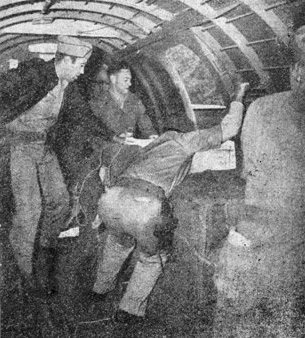 Circling the area down to which the supplies are to be dropped, packages are pushed one by one out of the
transport plane. Each parachuting package has a long release cord which is pulled by the men in the
plane.
Circling the area down to which the supplies are to be dropped, packages are pushed one by one out of the
transport plane. Each parachuting package has a long release cord which is pulled by the men in the
plane.
|
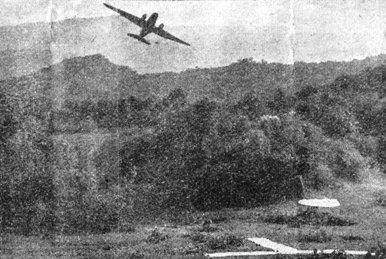 A "T" on the ground enables the pilot to know which area to circle so that the packages can be discharged.
One parachuted package is seen at right. As the plane continues to circle, more of the packages
are dropped to earth. Now you can see why packages are wrapped so carefully.
A "T" on the ground enables the pilot to know which area to circle so that the packages can be discharged.
One parachuted package is seen at right. As the plane continues to circle, more of the packages
are dropped to earth. Now you can see why packages are wrapped so carefully.
|
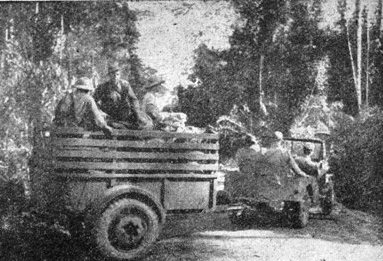 More discussions that will later become big headaches for the Japs. In the foreground is Gen. Arnold,
Brig. Gen. Clayton Bissell, Tenth Air Force Chief and Field Marshal Dill. Behind them T. V. Soong, Gen.
Wheeler, and Gen. Stilwell.
More discussions that will later become big headaches for the Japs. In the foreground is Gen. Arnold,
Brig. Gen. Clayton Bissell, Tenth Air Force Chief and Field Marshal Dill. Behind them T. V. Soong, Gen.
Wheeler, and Gen. Stilwell.
|
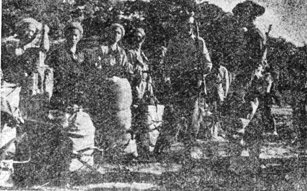 When the Jeeps can travel through the jungles no further, the supplies are then transported by Naga porters
and elephants. T/Sgt. Clinton Breedlove and Sgt. William L. Dean are seen organizing their porter caravan
to start out on a trek.
When the Jeeps can travel through the jungles no further, the supplies are then transported by Naga porters
and elephants. T/Sgt. Clinton Breedlove and Sgt. William L. Dean are seen organizing their porter caravan
to start out on a trek.
|
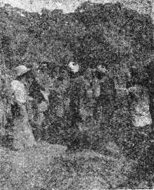 At a junction along the trail, Pvt. Jimmy Bartlett and T/Sgt. Breedlove pause to give cigarettes to the
Naga Chiefs.
At a junction along the trail, Pvt. Jimmy Bartlett and T/Sgt. Breedlove pause to give cigarettes to the
Naga Chiefs.
|
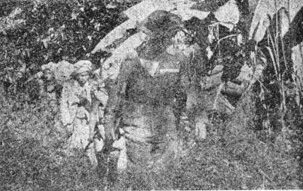 Sgt. William L. Dean leads his convoy of Naga porters, bearing rations and equipment through the jungle.
This region boasts of some of the most formidable obstacles ever encountered by man in a jungle area.
Sgt. William L. Dean leads his convoy of Naga porters, bearing rations and equipment through the jungle.
This region boasts of some of the most formidable obstacles ever encountered by man in a jungle area.
|
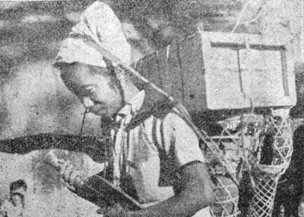 With a pack strung from his forehead, a Naga porter makes his way in the convoy - his native knife ready.
The Nagas used to make short work of all outsiders, but since the coming of the U.S. Army, they have
directed their efforts to helping.
With a pack strung from his forehead, a Naga porter makes his way in the convoy - his native knife ready.
The Nagas used to make short work of all outsiders, but since the coming of the U.S. Army, they have
directed their efforts to helping.
|
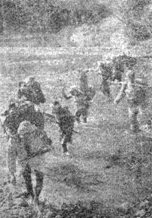 Pfc. Richard Maccio (right) fords a stream with a group of laden porters. Streams are only one of the
obstacles on the trail.
Pfc. Richard Maccio (right) fords a stream with a group of laden porters. Streams are only one of the
obstacles on the trail.
|
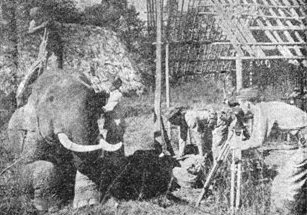 Elephants are unloaded at the end of a day's journey. These animals carry huge loads as they make their
way through the jungle. At extreme right is Corp. Nicholas Lyseczko, who shot movies while T/4 Stephen
Palinkas made these pictures.
Elephants are unloaded at the end of a day's journey. These animals carry huge loads as they make their
way through the jungle. At extreme right is Corp. Nicholas Lyseczko, who shot movies while T/4 Stephen
Palinkas made these pictures.
|
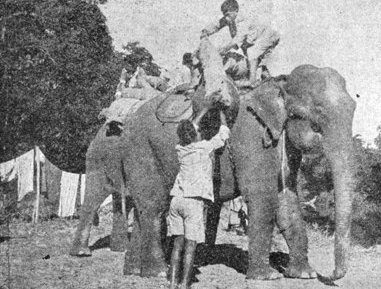 Nagas load the elephants for a day of travel. Travel must be made through almost impenetrable jungles,
in the heart of the monsoon forest, fed by some of the heaviest rains on earth. Most of the territory is
uncharted and unadministered. Maps of this area are usually blank or very unreliable.
Nagas load the elephants for a day of travel. Travel must be made through almost impenetrable jungles,
in the heart of the monsoon forest, fed by some of the heaviest rains on earth. Most of the territory is
uncharted and unadministered. Maps of this area are usually blank or very unreliable.
|
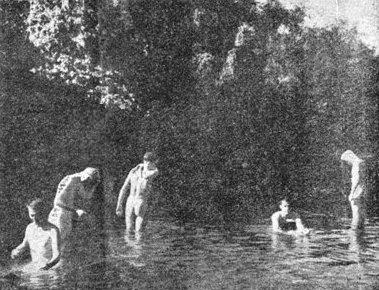 Soldier members of the trekking party take a bath in a jungle stream after an arduous day. Left to right
are: Sgt. William L. Dean, Pvt. Harry B. Swisher, Pvt. Kenneth C. Lawson, Corp. Darral L. McAfee, and Sgt. Milton
F. Elkins. They camped for the night nearby.
Soldier members of the trekking party take a bath in a jungle stream after an arduous day. Left to right
are: Sgt. William L. Dean, Pvt. Harry B. Swisher, Pvt. Kenneth C. Lawson, Corp. Darral L. McAfee, and Sgt. Milton
F. Elkins. They camped for the night nearby.
|
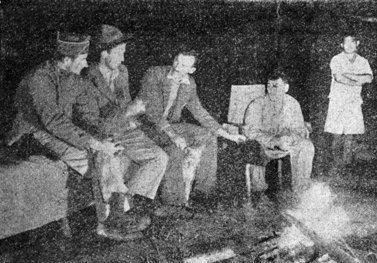 Here's a scene around the campfire during a night stopover. Corp. Lyseczko and Corp. McAfee chat with
a government official. He invited the boys to dinner of chicken and rice. The men gave him some "C"
rations, for which he was very thankful - a diet of chicken and rice gets very tiresome, he said.
Here's a scene around the campfire during a night stopover. Corp. Lyseczko and Corp. McAfee chat with
a government official. He invited the boys to dinner of chicken and rice. The men gave him some "C"
rations, for which he was very thankful - a diet of chicken and rice gets very tiresome, he said.
|
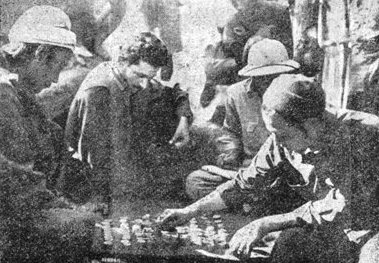 Here's the pay-off for the Naga porters at the end of the journey. Payment is made in silver rupees,
because the Nagas refuse to take paper money. The chief (left), known to our men as "Grandma," kept count
of the days by tying knots in a string. He and his assistants piled the money up, then used sticks to
divide.
Here's the pay-off for the Naga porters at the end of the journey. Payment is made in silver rupees,
because the Nagas refuse to take paper money. The chief (left), known to our men as "Grandma," kept count
of the days by tying knots in a string. He and his assistants piled the money up, then used sticks to
divide.
|
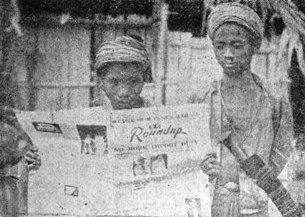 Packages of the Roundup were included in the supplies, and this pair of Nagas look over the paper.
These fellows, quite naturally, only showed interest in the pictures. Sorry, fellas, but we don't
have enough copies to go around to the tribe.
Packages of the Roundup were included in the supplies, and this pair of Nagas look over the paper.
These fellows, quite naturally, only showed interest in the pictures. Sorry, fellas, but we don't
have enough copies to go around to the tribe.
|
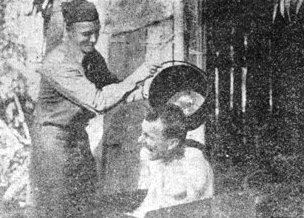 Outside his thatched bamboo "cottage," Corp. George W. Powell enjoys a bath through the cooperation of Sgt.
Arne A. Mtesa. The "bathtub" was improvised from the cover for a piece of equipment, because there was
nothing else available.
Outside his thatched bamboo "cottage," Corp. George W. Powell enjoys a bath through the cooperation of Sgt.
Arne A. Mtesa. The "bathtub" was improvised from the cover for a piece of equipment, because there was
nothing else available.
|
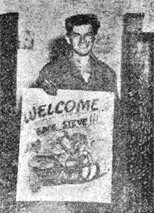 "Private Gee Eye" was on hand to welcome photographer Palinkas, who used to build boats before he joined
the Army.
"Private Gee Eye" was on hand to welcome photographer Palinkas, who used to build boats before he joined
the Army.
|
|
Tuesday, Feb, 2, 9:45 p.m. - "Your Broadway and Mine" starring Frank Morgan, Case Daley, Lee Tracy, Margaret Hayes, Charles Irwin and the Mills Brothers. Wednesday, Feb. 3, 10:05 p.m. - "Swing Session" with Kay Kyser's orchestra. Each Monday, from 1:00 p.m. to 1:30 p.m., the Calcutta Centre of All India Radio, 384.6 meters and 41.61 meters, broadcasts a special program for servicemen in India. Once every three weeks, the broadcast is exclusively for Americans. |
By S/SGT. K. W. MARTINDALE
Oops, seems we missed a column last week. And after we'd promised the Major to be true to the Roundup, too! Sorry, we'll try and be better.
The "second division" of hopeful aspirants for OCS went before the 10th Air Force board the other day. Now you sweat it out for six months, boys, after they tell you "no vacancies."
Our outdoor movies are now out in what is practically the open jungles, on the edge of the runway. makes it nice having the roar of transports blotting out the dialogue.
A nice bow in the direction of 1st Sgt. Marvin Hunn and Pvt. James Dayle, who arranged and sent in the Roundup's full-page spread of pictures on the Depot last week. One of these days we'll break down and get some taken ourself.
These balmy days bring back memories of spring back home, the time when "a young man's fancy lightly turns, etc." Over here, it doesn't turn, it just stays there all the time.
Personnel boys are sweating out the magnificent new Group Headquarters building going up. Seems they're each to have private offices with personal secretaries, and such. By the way, whatever happened to Sam Wilkinson's weekly jottings for the Roundup?
Capt. Baker, our special services officer, has big plans a-hatching for use of our new service club, shortly to be opened to the horde. The captain has $3,200 he wants advice on how to spend. Any suggestions, boys?
Our apologies to J. Michael Rune, the "Frank Buck" of the QM whom it seems we missed in our deer-hunting story. J. Michael has produced photographs showing him astride the kill, so we guess it must be so.
Sgt. D. S. Clark has established the Headquarters Squadron branch of the Depot library in his foot locker. The snap-shooting sergeant has all the latest magazines from Esquire to the New Yorker. Those full-page color Hurrell photographs - my, my!
REVISED LIST OF “THINGS WE COULD DO WITHOUT”
By T/3 KENNISON COOK
Rumors are plentiful throughout this theater and are usually taken with a grain of salt by experienced G.I.'s who have been pestered by one after the other for the past year.
T/4 James Reed, a cryptographic clerk, started one here that sounded like the real thing and gained such rapid momentum that within an hour after its birth everyone in his outfit had a bad case of chronic meloncolevitis (a horrible malady combining the worst features of melancholy and envy which leaves its victims in a bad mental state).
Reed's rumor was of the ordinary "going home" variety but had an "Honest Abe" ring to it. His story was that a certain captain from his home town in Arkansas was going back to the States on a special mission and had been authorized to take one enlisted man along as a secretary. Reed, being the only local boy around, was
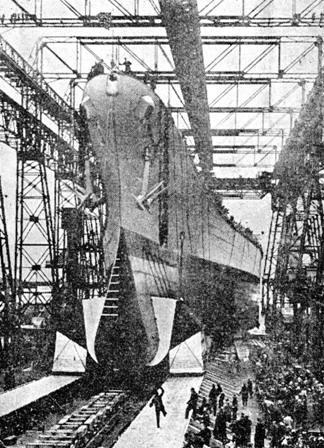 The U.S.S. New Jersey, the largest battleship ever built, starts down the ways of an East Coast
shipyard - 18 months ahead of schedule. On the same day U.S. shipyards sent 25 other vessels to sea.
MORE
The U.S.S. New Jersey, the largest battleship ever built, starts down the ways of an East Coast
shipyard - 18 months ahead of schedule. On the same day U.S. shipyards sent 25 other vessels to sea.
MORE
|
CHEER THE HOME FRONT
T/3 Frank Barnes received a letter from home last week which said in part that one of his friends, stationed at an Army camp on the East coast in the States, was homesick and a letter would cheer him up. Barnes doubts whether a letter from him would do much good at this stage in the game. It is our sincere hope that poor homesick lad never had the misfortune to the stationed in the land of bakshees. If he is homesick in the States what would he ever do here?
As they say it's every soldier's right to do a little griping, here's our contribution - This one is not the usual "I want to go home" variety, that's already been played out but how's about a few days' furlough to Calcutta or any of the larger cities where we can get away for a while. We have been working shifts around the clock for almost a year now and think we are entitled to a little leave. They do it in Greenland, Ireland, England, Australia and even the good old U.S.A. What's the matter with India?
IN ORDER OF IMPORTANCE
Not to be outdone by Paul Gallup, we have recently completed a poll here on "things we could do without." The first ten, in order of importance were (1) Indian children ranging from two to seventy years old, who follow us about crying "Bakshees, Sahib." (2) Fellows who dash into the barracks screaming "Mail Call" when the latest communiqu is yesterday's copy of the Statesman. (3) News about all our friends back home who are making commissions after a few months' service. (4) All untrue rumors about going home. (5) That overworked statement on the part of old-timers. "It wasn't like this in the old Army." (6) Self styled G.I. linguists who insist on mixing a little, usually improper, Hindustani with their not-too-good English. (7) People, who have moral objections to the Roundup's cheesecake photos. (8) Quotations from our erstwhile bible, the Articles of War by alleged "Guardhouse Lawyers," (9) Indian "Gopher" matches (except when no others are available). (10) Electrical storms which make radio reception almost impossible.
THE JOINT’S JUMPIN’ UP IN ASSAM
By DARRELL BERRIGAN United Press War Correspondent
At the Bamboo Inn, deep in the jungles of Upper Assam, a very hep swing band nightly takes a certain Negro battalion back home with the latest in swing and boogie-woogie.
There's another Old Man River,
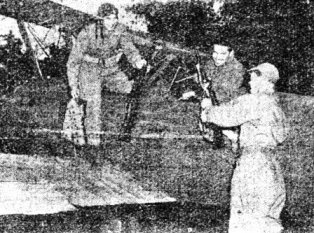 Maj. Paul C. Droz (left) climbs from the cockpit of his primary training after rescuing Lieut. Willard A.
Wendt, who tells a crew chief how he had to bail out of his fighter plane and landed in a seemingly hopeless
spot. Wendt's rescue was the third that Droz has made in the little plane.
Maj. Paul C. Droz (left) climbs from the cockpit of his primary training after rescuing Lieut. Willard A.
Wendt, who tells a crew chief how he had to bail out of his fighter plane and landed in a seemingly hopeless
spot. Wendt's rescue was the third that Droz has made in the little plane.
|
The Bamboo Inn is a clearing cut in a bamboo thicket, the living bamboo pulled in to form a roof, and the floor covered with cut bamboo. On Sunday the Inn is the Chapel, but on weeknights it is, according to Freeman, "a mellow place" where the latest - for India - American jive can be heard.
The band was organized after the battalion landed at an Indian port several months ago by W/O Harry H. Hollowell. His right hand man and the man who writes the arrangements is Sgt. Ike Jones, who wrote the regimental song "Blazin." When I arrived at the Bamboo Inn, Ike was writing the arrangement for the song "Praise the Lord and Pass the Ammunition." Asked whether the song was good, the arranger said, "Well, I dunno. But it'll be good when we get through with it."
I sat through a jive session with about 100 colored troops at the Bamboo Inn. Freeman acted as master of ceremonies calling on the men to "jump right in the mood with us and get in the jive. Let me see your foots move." Sgt. James Shannon, Corp. Wallace Gwatney and Corp. Manlest Wray furnished the vocals, in turn and the "foots" moved out in the audience.
Out in the jungle hemming in the camp, the local inhabitants screeched their displeasure at the unnecessary noise. But the Brahmaputra was the Mississippi and the boys of the battalion were ignoring their neighbors for the night.
Joe, the Grinder, had better watch out when the boys of this Negro battalion get home, because they'll be looking for him and no holds barred.
The Grinder, according to these lads, is the man who's home striking for higher wages, leaning against their old post at the general store, and taking out their wives and sweethearts. He's doing all the pleasant things they left behind to fight the war and these boys are going to get even with him "jest as soon as the boat lands."
“No (Carpenter) Job Too Big Or Too Small” For Berkes
By Sgt. JACK COE
Writing columns has been as prominent in our Army career as allotment deductions are to our monthly take at the detachment pay table, so it seems a foregone conclusion that we're again "columnizing" after a long layoff, and miles from sunny Florida and dusty Texas.
Starting with this effort, A.F.R.C. at an Indian Port Base is ushered into the corral.
"Dorothy Lamour," we mean, "Joe Job P.F.C.," the AFRC musical comedy production by Corp. Addison Bailey, went by the boards a week earlier than previously announced. A rousing success was Joe! The past week has found the "Little AFRC Theater Players" on repeat performance calls from various units in the area.
"Dotty," sarong and everything, was impersonated by Pvt. William (Duke) Suedmeyer, CBI's own "Margy Hart." Pvt. Manny Ituarte played the other female part, a nurse.
"Joe Job" was played by Pvt. Bob Smith. Other leading parts were taken by Pvts. Ed Unalt, John Maule, Paul Chenoweth, Kelly Seay, Leonard Silver and "Big Stoop" Bob Naves. The latter was also stage and scene director. Prop man was Corp. Gilba Kitchen who could even get green grass for us.
INGENUITY
The Base's best booth for movie projection, complete with sliding panels, peepholes, pedestals and shelves, was opened at a recent movie in the area. "Projeg" operators marveled at the G.I. ingenuity displayed in the booth's construction. Corp. Gilba Kitchen and Pvts. Willard Short (now in China), Ervin Simon, Dean Stitcher and Tom Berkey, carpenters, take a bow! Berkey, "The Mad Russian," who boasts on his tool kit that there is "no job too big or too small," has been contemplating construction of a fashionable barber chair for the "salon" of Pvt. Melvin Casale, "now-I'm-in-now-I'm-out-mohair" of the organization.
recent dismantling of the area flagpole for repairs and subsequent abolishment of raising and lowering did not deter the six men in Corp. Bailey's tent. Bailey set himself up as "C.O." and had Pvt. Glenn Alberts erect a miniature flag staff in front of the tent. Every morning they and the other men in the tent, Pvts. Jim June, Lloyd Towns, Bob (Big Stoop) Naves and S. A. Wojoiechoskski (correct) would stand reveille; and each evening while Bailey whistled "To The Colors" and Alberts lowered the flag, retreat would be observed. Within, the C.O. had a well-filled bulletin board, replete with special orders, duty roster, orders of the day and company punishment.
Big Stoop was brought before a "Summary Court Martial" this week, and sentenced to be deprived of G.I. and P.X. candy for one week, for getting the boys lost in the trackless desert surrounding the Base, his second offense. One other time he slept through breakfast. "Sacrilegious," says the C.O. "Such an oversight, if encouraged, will engender lack of confidence in the white coated gentry of the kitchen, and render the position of Mess Sergeant Freddy Bumgarner highly untenable and serious."

THE AMERICAN FLAG Fling out that American Flag Of red, white, and blue Lead on you sons of freedom Loyal and true Keep our banner flying So everyone can see Tell all people the American concept of a life of liberty. Send your men into battle In any foreign land The outcome of that battle will prove That your sons have sand. All around us today Great nations crumble and fall We won't let that happen To the greatest nation of all. Where ever we face our enemies Be they Japs or bloody Huns They'll damn soon know they're fighting Good tough American sons. - Pvt. Howard C. Allen |
|
A NOTE TO A SOLDIER'S "WAVE" But she's true to the Navy blue. Not that it'll likely alarm me Cause she likes the Navy too. You see, it's her job this here Navy She threw herself in the WAVES! Yes, b'gosh and b'gravy Signed on with Gobs of male knaves! And me . . . being Army since Hector First wobbled around as a pup; If I'd a been there, I'd a licked her As soon as my dander got up. But now that she's gone and done it I reckon there's nothing to say But "Go to it, my sweet little nit wit I'm with you each step of the way. But if the Navy gets stumped, say In one of its manifold jobs You must remind them of OUR way And there sure won't be any blobs! So you help out with the sailors And I'll do what I can over here And sooner or later the wailers Will be Germans and Japs - never fear! - E. D. S. |
|
THE ARMY AIR CORPS Where ever you find an Army corps Or a regiment of men You'll find the Army nurses Marching on along with them. You'll find them near the battle lines Within the range of shell And you'll find the names of many On the rolls of those who fell. They never charge the line itself They never rake the foe And yet they'll answer "present" Where ever soldiers go. Yes, these are the unsung heroes For they stand with the best of men And they ask no special privileges When they follow after them. I've seen them stand on the trembling earth And smile in the face of death While the bravest of manly heroes Stood gasping for want of breath. I've seen them stand in the light of clover Weary and foot-sore too And of them, I say, in a reverent way "How much we owe so few." They give their best meeting every test Despite the bombs and shells And the God above shall with his love Reward and keep them well. - Sgt. Harry Warren |
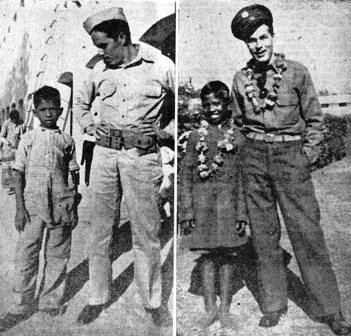 One night when Pvt. Homer W. Myers was on guard duty, a small Indian boy turned up, sobbing that he was cold
and had no place to sleep. At the left, Myers is seen with the lad, his clothes torn and his shoes completely
worn out. At the right, Myers is seen with the same boy a few weeks later, during which Myers bought the
lad clothes, sent him to a day school, provided him with a home, thus changing a
raucous, cigaret-smoking, cursing
little beggar into a well-mannered and happy boy.
One night when Pvt. Homer W. Myers was on guard duty, a small Indian boy turned up, sobbing that he was cold
and had no place to sleep. At the left, Myers is seen with the lad, his clothes torn and his shoes completely
worn out. At the right, Myers is seen with the same boy a few weeks later, during which Myers bought the
lad clothes, sent him to a day school, provided him with a home, thus changing a
raucous, cigaret-smoking, cursing
little beggar into a well-mannered and happy boy.
|
CONFUSION VIA MAIL
By Pvt. LEE KRUSKA
SHORT TAKES: Ever since the last mail call, Medic Corp. Harold Moore has been the most puzzled man in the organization. "I think my wife and mother should get together," he explains. "One writes and tells me I'm the father of an eight and one-half pound daughter, the other says it's a son. Now what I'm wondering is 'What in hell is it, boy or girl - or twins?'"
Asked in a recent early-morning formation why he had not turned in his pass the previous night, Pvt. J. B. Reynolds indignantly asserted he had. Then doubt clouded his mind and in almost the same breath he hesitatingly added: "It was either the pass or the rupee note." Investigation disclosed it was the latter, neatly folded.
Already functioning and turning out work of professional calibre is the unit's new photographic section. Headed by S/Sgt. Joe Springer, it includes Sgt. (Snuffy) Anderson, Lee Johnson and Charles (Chuck) Williams. The group does all the developing for the squadron and personnel. . . It may be wise to omit the name in this case, but when Acting 1st Sgt. Charles Carr recently told members of an afternoon formation to continue with what they did in the morning, one chap fell out and in sotto voice remarked to his pals: "That's all I wanted to hear. Now I can go back to sleep."
MOST ANYTHING: When and if the squadron talent shows are again staged, they should include Sgt. Charlie Amendola and his impersonations of Prof. Jerry Colonna. He lacks only the mustache. . . India gets 'em sooner or later, even those of sharp, legal mind. Pvt. John Odishio, for example, was running around the other day looking for something with which to puncture the top of a talcum powder box when all he had to do to open the container was twist the cap. John won't admit it but these lapses must worry him no end.
NEW ROUNDUP EDITOR
With this issue the Roundup gets a new editor and assistant.
Lt. Clancy Topp, heretofore assistant editor, takes over and Lt. Floyd (Bucky) Walter, former San Francisco News baseball writer, becomes the assistant.
The old regime remains in a supervisory capacity and, in fact, is making this announcement in order to spare the delicate sensibilities of Topp whose "penchant for anonymity" has become one of the most highly publicized foibles in New Delhi.
Henceforth, gents, mail your copy and pictures to Lt. Clancy Topp, Rear Echelon, USFCBI, New Delhi, India.
|
To the Roundup Editor:
Note: We couldn't supply a late snapshot of Margie Hart but this is pretty hot.
Although we seldom read past the captions under the sex pictures on the first page, or some story about Errol Flynn's latest escapade with some 17-year-old California waif, during the past two weeks we glanced at a column planted in the middle of you last page throwing bouquets to some S.O.S. outfit we never knew existed 'til we read it in your column.
I don't blame the boys for bragging about themselves, because reading their name in print is about the only glory they'll get over here, that old saying, "There'll be no promotions this side of the ocean" must be the slogan of C.B.I. We saw last week where 72 officers were made generals, but here we are, graduates of Army Technical Schools and our arms are stripeless as a Park Avenue dress shirt. Of course, nine months ago we heard out T.O. was on the way, so we can't complain cause the Army never kids about anything. I'm sure they're just around the corner (All we have to do is go around the corner and get them, it's just beyond the Burma Road).
I suppose you fellows will cry when you get this single-spaced copy, but we're conserving paper for those corporal sergeant and staff sergeant warrants you fellows won't be running off for us soon.
Oh, by the way, I might as well tell you what outfit I'm writing for we're the fellows at the Depot that does all the Air Corps supplying around here, or didn't you know there was an Air Corps over here in the C.B.I. Theater. Our job is to classify, pack, repair, rush and ship the Air Corps supply equipment so the fellows at another Air depot, who have more stripes than a Gold Coast zebra can sit back and keep their T.O. straights. (Oh yeah, I think they gave us a rating once, it went to a corporal named Rossiter, who only handles the repair of all the equipment here, fixes the parts so repairable part tags can be fixed, and the rest of the time cleans spark plugs). (Some of the fellows say they don't mind working 8 days a week but when they start working 25 hours a day that's out).
We don't handle much of the property, we just get the shipments by boat and plane, those that come by trolley car go direct to the Air Depot.
Some of the fellows have a full hitch in and have excellent records, and really work here, when the shipments come in heavy they willingly work til 8 and 9 p.m. with no beefs, and we never get to see the wonderful Taj Mahal on three-day passes either. Our technical sergeant supervisor has 16 years' service in, has been a technical sergeant over a year, and is as bad off as the privates - not matter, no 2nd "looey" and no warrant officer promotion.
I know a fellow who flunked out of my armorer course and then went to a reception center and drilled recruits. I got a letter from him last week, and guess what he is? You guessed it - staff sergeant. I graduated from the school with a proficiency over 90. I'm only a private at the depot.
Well, I guess we'll all forget the beefs if we can get this thing over with and get back to the States with good old Casey's Tool Works, where there's always a T.O. However, next time you want to fill the back page, for gosh sakes look us up, will you, you know the Air Corps is fighting this war too, just ask the Japs. - Pvt. Joe McGovern
The C.B.I. Roundup is a weekly newspaper published by and for the men of the United States Army Forces in China, Burma, and India, from news and pictures supplied by staff members, soldier correspondents, Office of War Information and other sources. The Roundup is published Thursday of each week and is printed by The Statesman in New Delhi, India. Editorial matter should be sent directly to Lieut. Clancy Topp, Rear Echelon Hq., U.S.A.F. C.B.I., New Delhi, and should arrive not later than Monday in order to make that week's issue. Pictures must arrive by Sunday and must be negatives or enlargements. Stories should contain full name and organization of sender.

JANUARY 28, 1943
Adapted from the original issue of CBI Roundup
Copyright © 2009 Carl Warren Weidenburner
TOP OF PAGE PRINT THIS PAGE ABOUT THIS PAGE SEND COMMENTS
PREVIOUS ISSUE CLOSE THIS WINDOW NEXT ISSUE
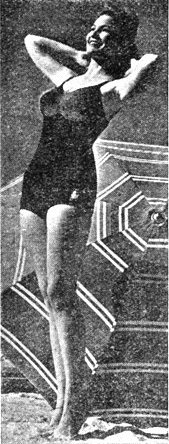 In Southern California, where there's at least one lovely per square yard, a clothing manufacturers'
association held its convention. After much ogling they voted Edith Leach as the "model most likely to
succeed."
In Southern California, where there's at least one lovely per square yard, a clothing manufacturers'
association held its convention. After much ogling they voted Edith Leach as the "model most likely to
succeed."

